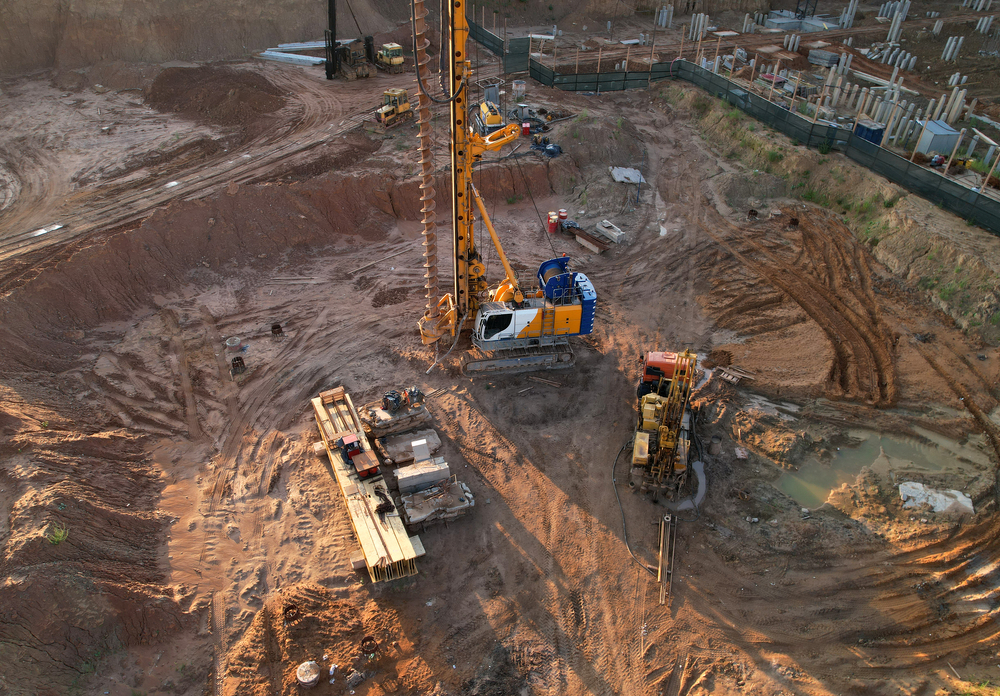9 Easy Facts About Geotheta Shown
Table of Contents3 Easy Facts About Geotheta ExplainedThe Only Guide for GeothetaExamine This Report about GeothetaA Biased View of GeothetaGeotheta Fundamentals Explained

They perform site investigations, gather samples, perform research laboratory examinations, and assess information to assess the viability of the ground for building and construction projects - Geo Tech Engineer. Based upon their searchings for, geotechnical engineers supply referrals for foundation style, incline stability, keeping structures, and reduction of geotechnical threats. They team up with various other specialists, such as designers, structural designers, and building and construction teams, to make sure that geotechnical factors to consider are incorporated into the general job layout and execution
By evaluating the actions and properties of soil and rock, they can identify prospective geotechnical hazards such as landslides, soil settlement, or incline instability. Their expertise aids prevent failures or accidents that might threaten lives and residential property. Right here are some detailed responsibilities and responsibilities of a geotechnical designer: Website Examination: Geotechnical designers conduct site investigations to gather information on subsurface conditions.
They interpret the data to recognize the properties and habits of the soil and rock, including their toughness, leaks in the structure, compaction features, and groundwater conditions. Geotechnical Evaluation and Layout: Geotechnical engineers examine the information collected throughout site examinations to assess the security and suitability of the website for building jobs. They perform geotechnical calculations and modeling to review aspects such as bearing capability, negotiation, incline stability, lateral earth stress, and groundwater flow.
7 Easy Facts About Geotheta Explained
Foundation Layout: Geotechnical designers play an essential role in creating foundations that can securely sustain the intended framework. They assess the soil problems and load demands to identify the appropriate foundation type, such as shallow foundations (e.g., grounds), deep foundations (e.g (https://geotheta.godaddysites.com/f/why-geotechnical-engineers-are-your-projects-best-friends)., stacks), or specialized strategies like dirt renovation. They consider variables such as negotiation limitations, birthing capability, and soil-structure interaction to establish optimal foundation layouts
They examine building plans, monitor site activities, and conduct area assessments to verify that the style recommendations are complied with. If unforeseen geotechnical concerns develop, they assess the scenario and provide suggestions for remediation or modifications to the design. Risk Analysis and Mitigation: Geotechnical engineers assess geotechnical dangers and threats connected with the job website, such as landslides, liquefaction, or dirt disintegration.

Cooperation and Communication: Geotechnical designers work closely with various other specialists entailed in a job, such as designers, architectural engineers, and construction groups. Reliable communication and cooperation are vital to integrate geotechnical factors to consider right into the general project design and building and construction process. Geotechnical designers supply technical expertise, response questions, and ensure that geotechnical demands are satisfied.
Some Known Details About Geotheta
Right here are some sorts of geotechnical designers: Structure Designer: Structure engineers specialize in designing and evaluating foundations for structures. They assess the soil problems, tons demands, and website attributes to establish one of the most appropriate structure type and style, such as shallow foundations, deep foundations, or specialized techniques like pile structures.
They review the variables influencing slope security, such as dirt homes, groundwater problems, and slope geometry, and develop techniques to avoid slope failings and mitigate dangers. Earthquake Engineer: Quake designers focus on evaluating and developing frameworks to endure seismic forces. They evaluate the seismic hazard of a website, assess dirt liquefaction capacity, and establish seismic layout standards to guarantee the safety and security and durability of structures throughout earthquakes.
They perform field testing, collect examples, and examine the gathered data to identify the dirt buildings, geologic developments, and groundwater problems at a site. Geotechnical Instrumentation Designer: Geotechnical instrumentation engineers concentrate on monitoring and gauging the habits of dirt, rock, and structures. They mount and maintain instrumentation systems that monitor variables such as dirt negotiation, groundwater degrees, slope motions, and structural variations to evaluate efficiency and provide early cautions of potential concerns.
Geotheta Things To Know Before You Buy
They carry out tests such as triaxial tests, consolidation tests, direct shear tests, and leaks in the structure tests to collect information for geotechnical analysis and layout. Geosynthetics Engineer: Geosynthetics designers focus on the layout and application of geosynthetic materials, such as geotextiles, geogrids, and geomembranes. They utilize these products to boost soil stability, reinforce slopes, supply drainage services, and control disintegration.
They have a tendency to be investigatory people, which indicates they're intellectual, introspective, and analytical. They are curious, methodical, reasonable, logical, and logical. Some of them are likewise social, meaning they're kind, generous, cooperative, patient, caring, valuable, understanding, sensible, and friendly - Geotechnical Engineers.
In the workplace setting, geotechnical engineers utilize specialized software tools to carry out estimations, produce layouts, and assess information. They prepare reports, testimonial job specs, connect with customers and employee, and coordinate task activities. The workplace setting provides a favorable environment for research, analysis, and partnership with other specialists entailed in the project.
The 9-Second Trick For Geotheta
They regularly see task websites to carry out website investigations, examine geotechnical conditions, and collect data for analysis. These brows through involve taking a trip to different places, sometimes in remote or difficult surfaces. Geotechnical engineers may do dirt tasting, conduct tests, and monitor building and construction activities to ensure that the geotechnical facets of the task are being carried out correctly.
Geotechnical designers likewise operate in specialized geotechnical laboratories. In these facilities, they conduct experiments, execute examinations on dirt and rock examples, and examine the click here for more info engineering residential properties of the products. Geotechnical research laboratory designers work thoroughly in these settings, taking care of testing devices, running tools, and recording data. They collaborate with other lab personnel to make certain precise and trusted testing results.